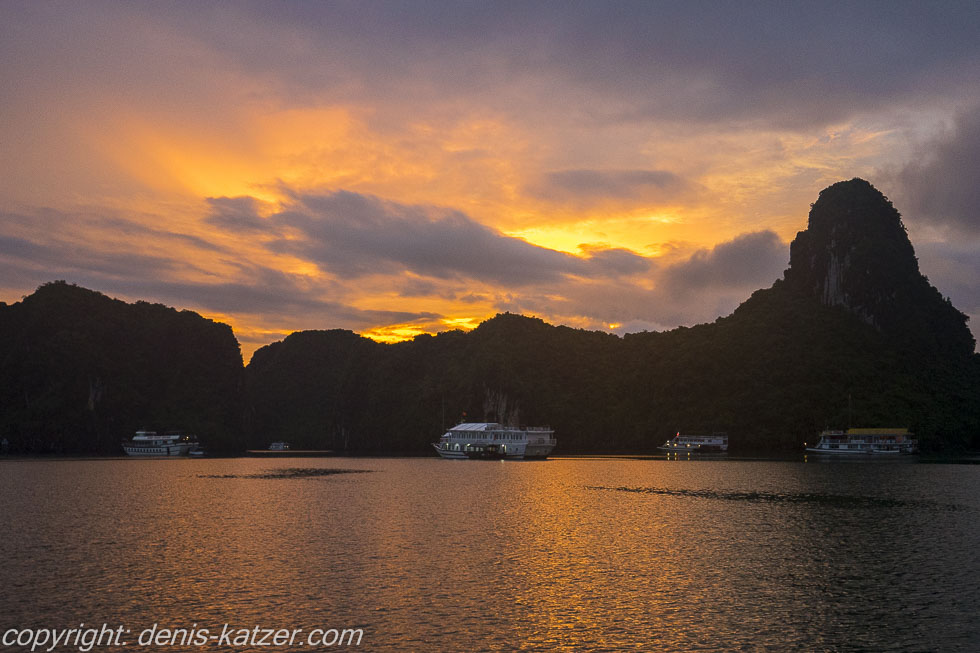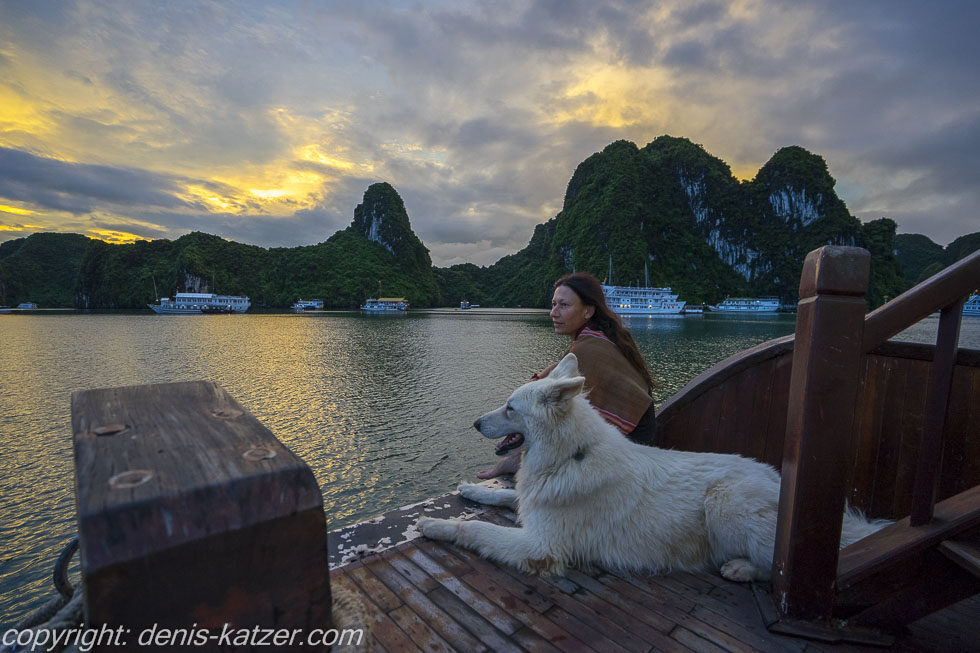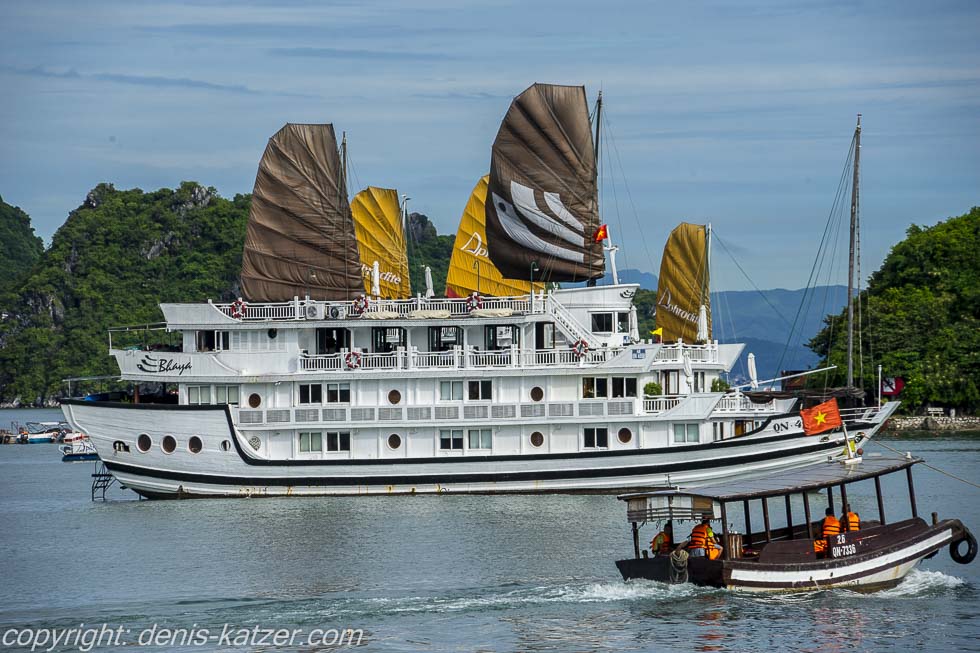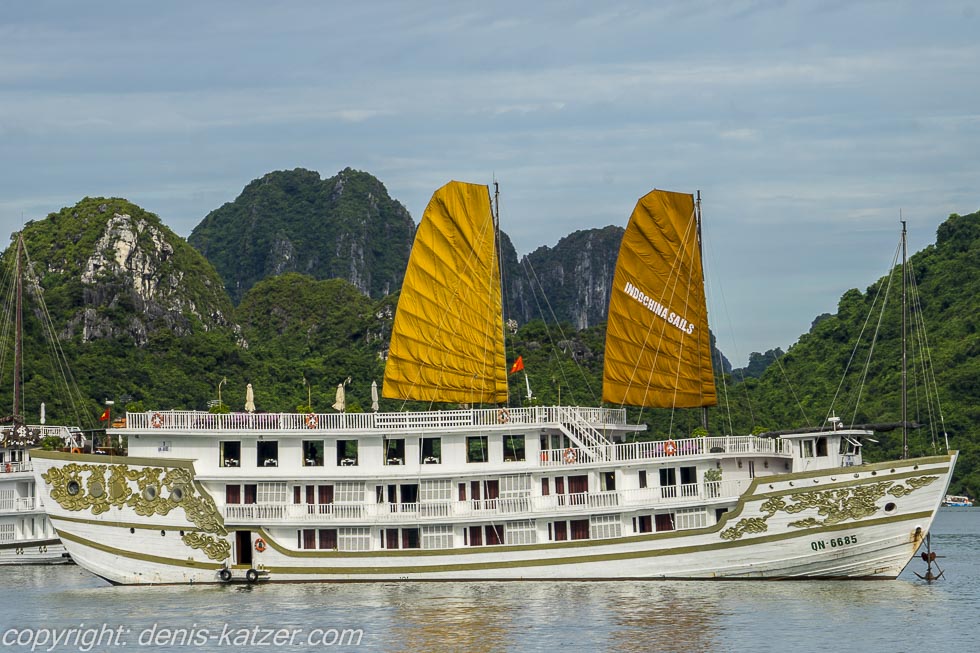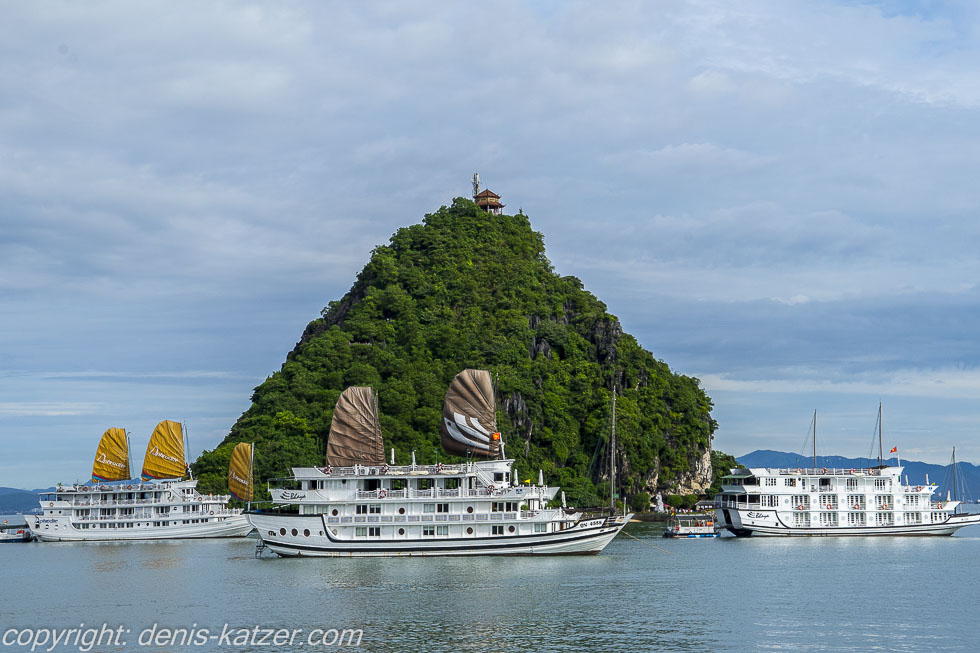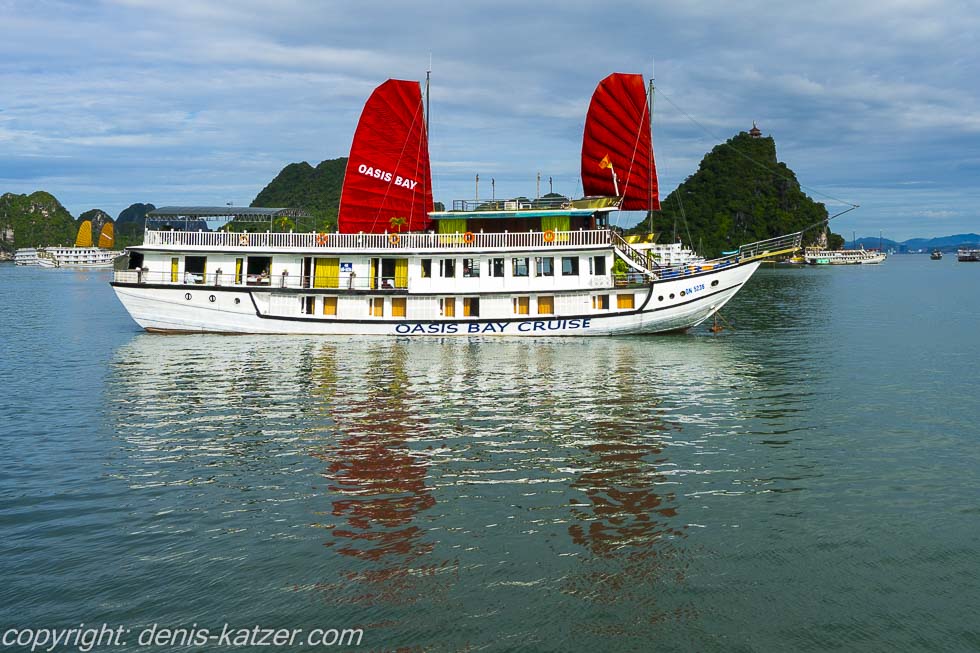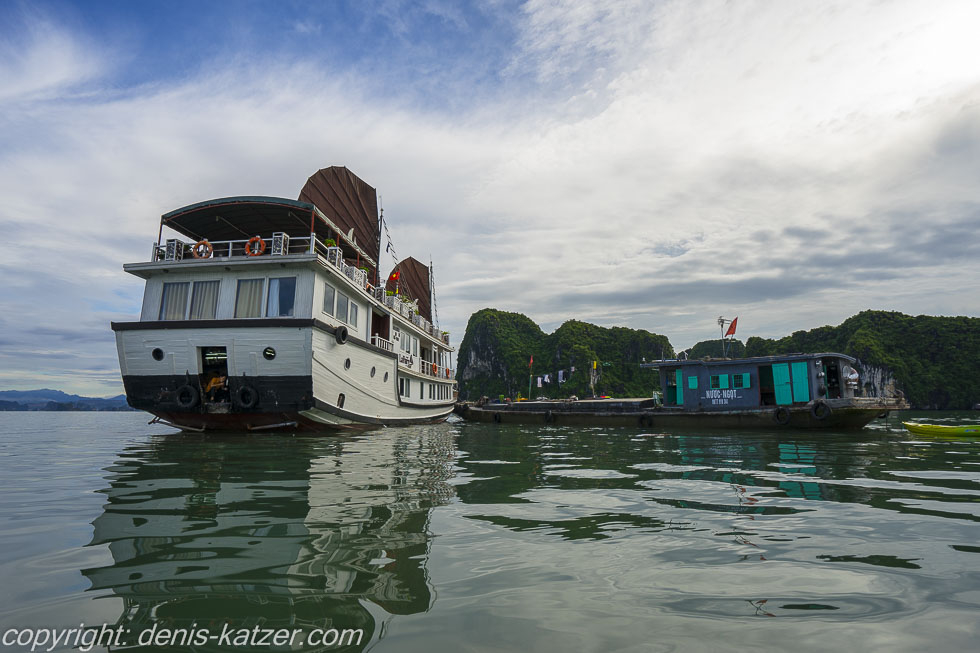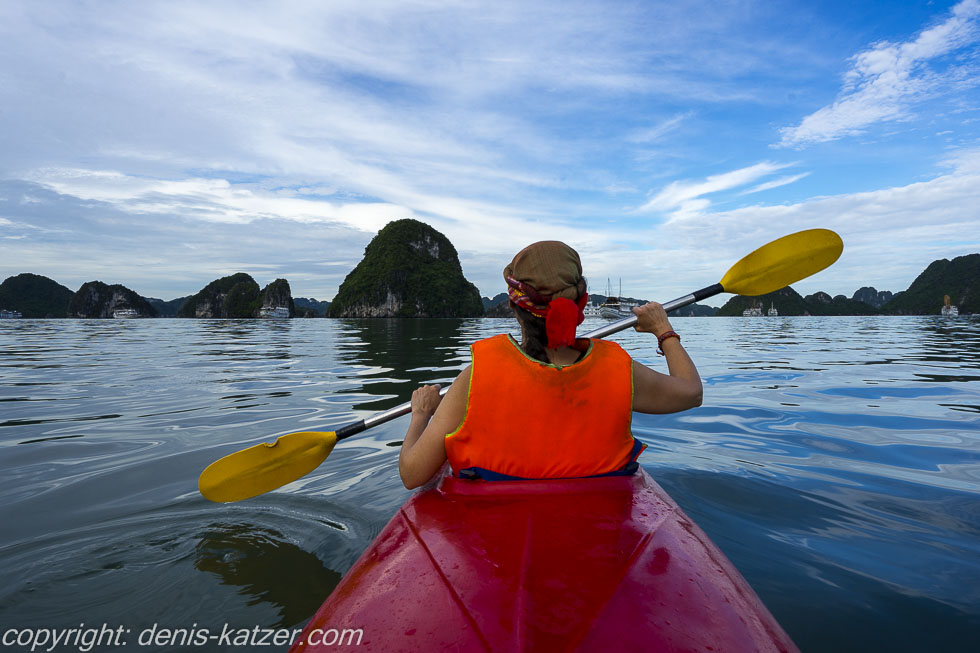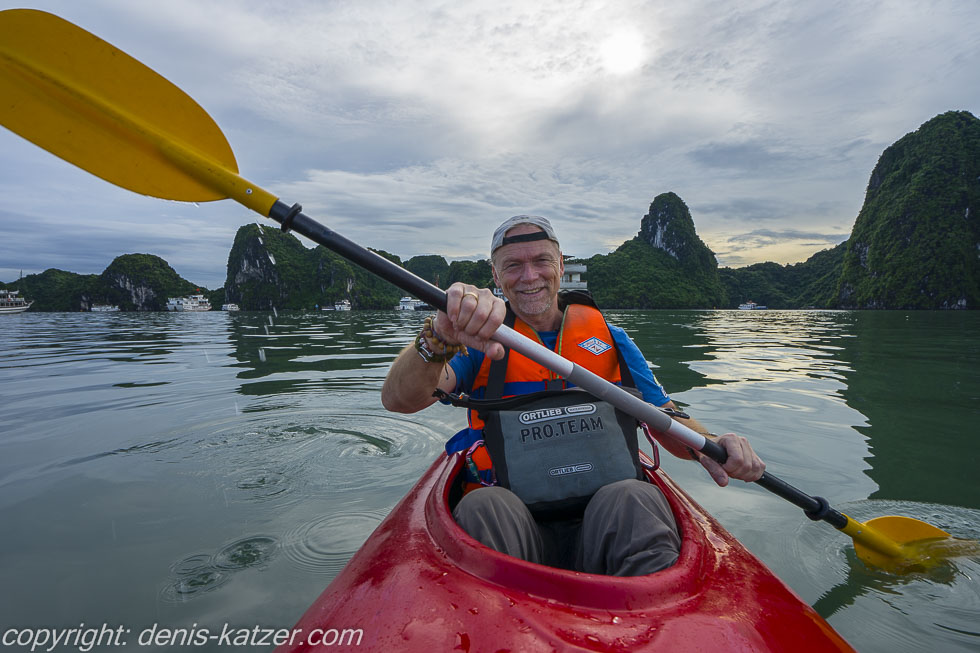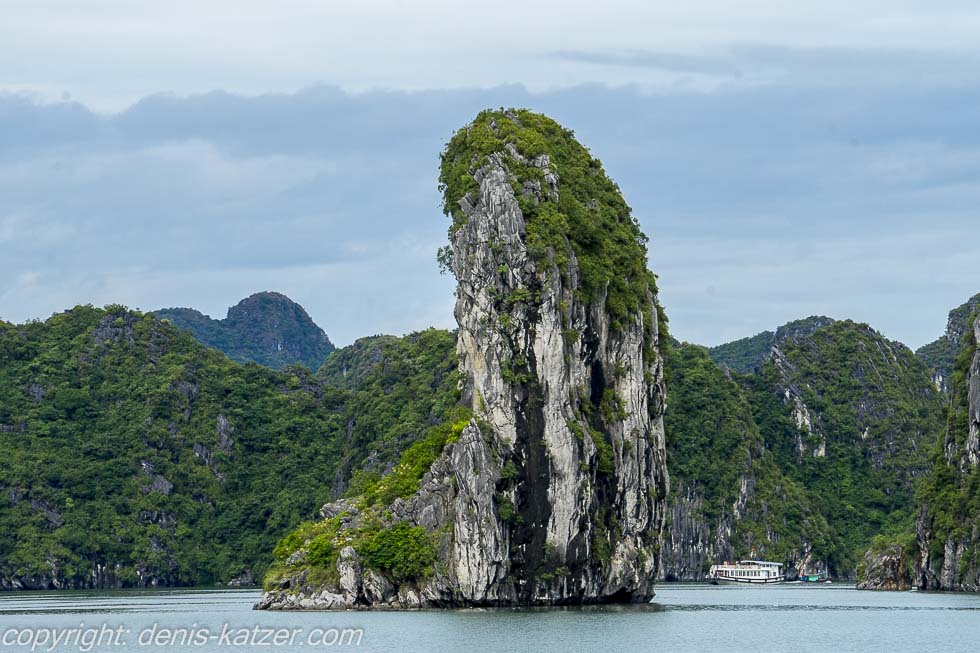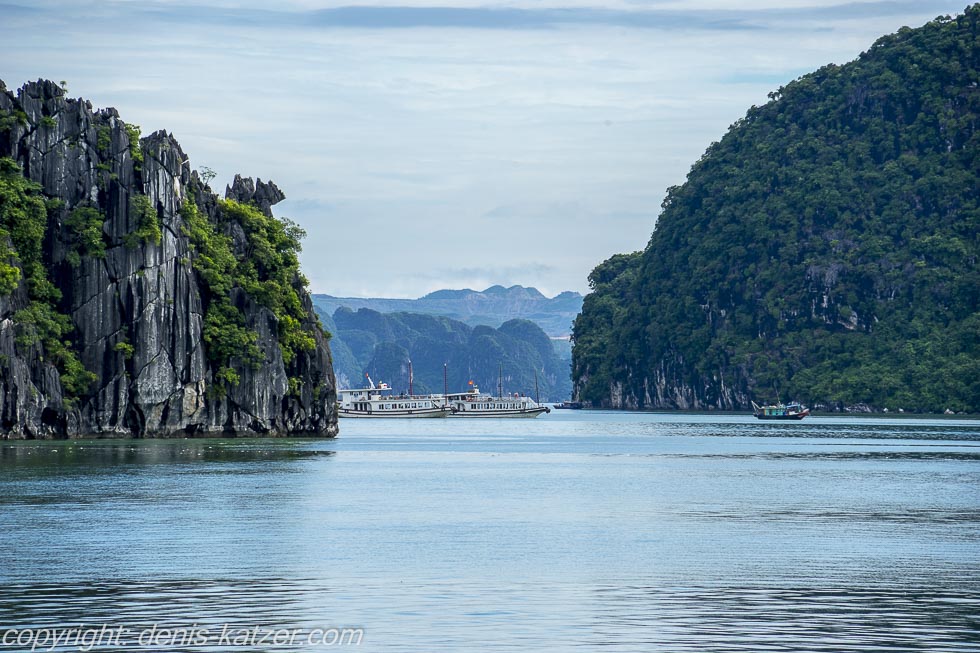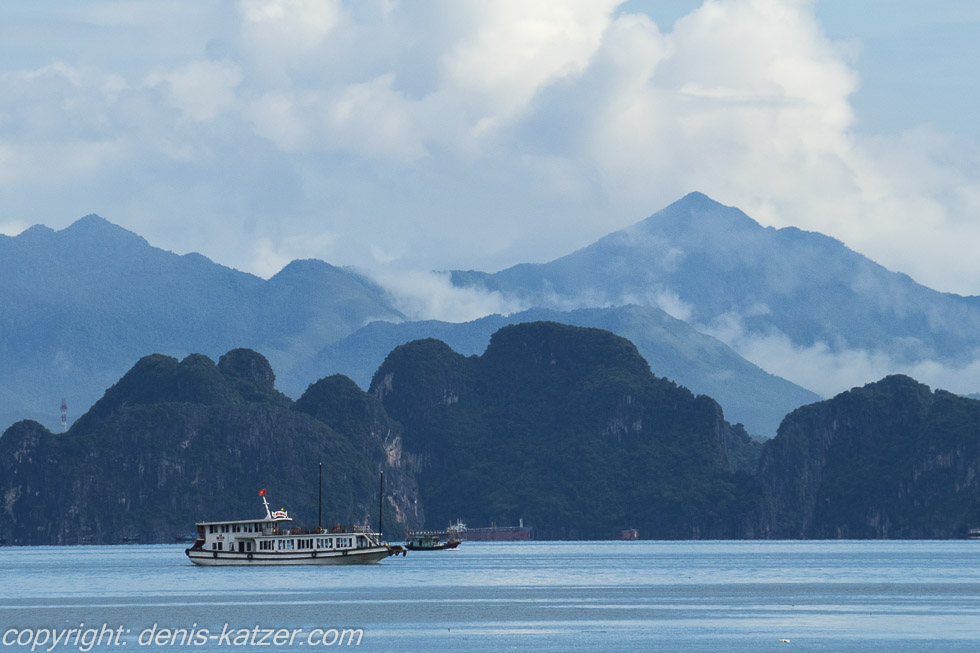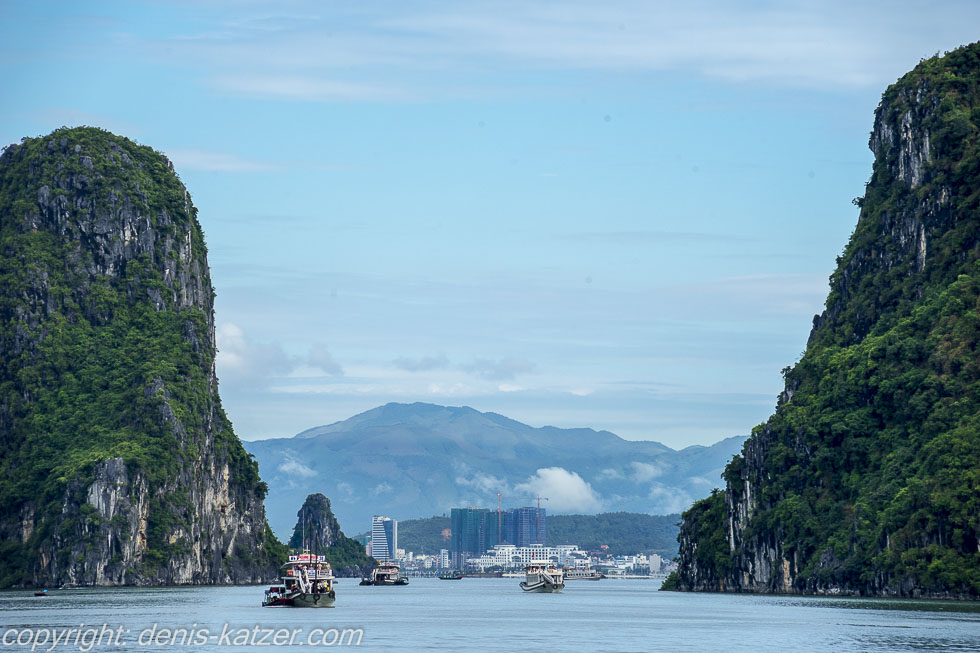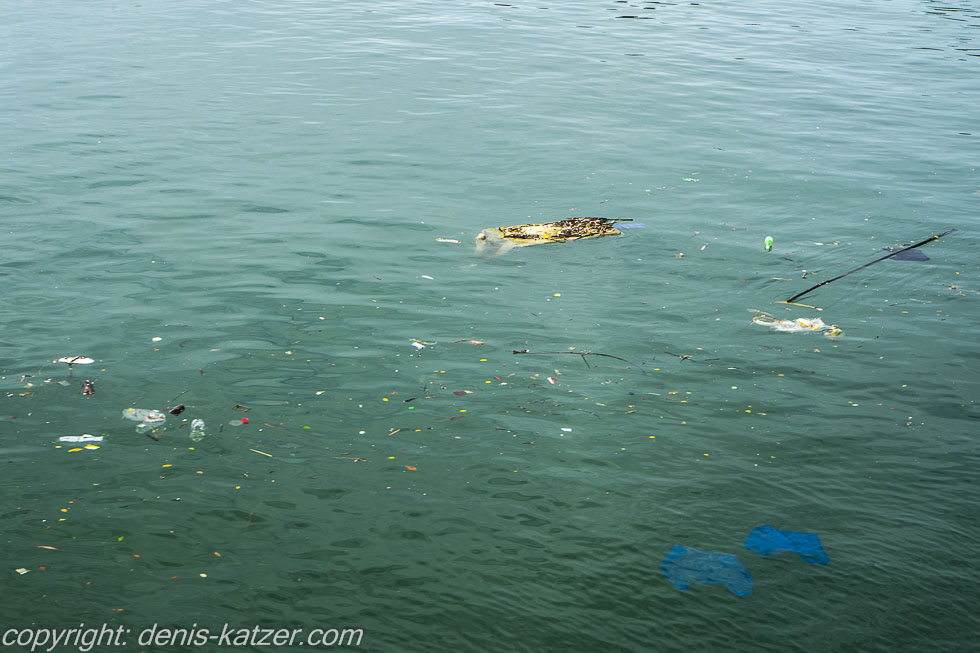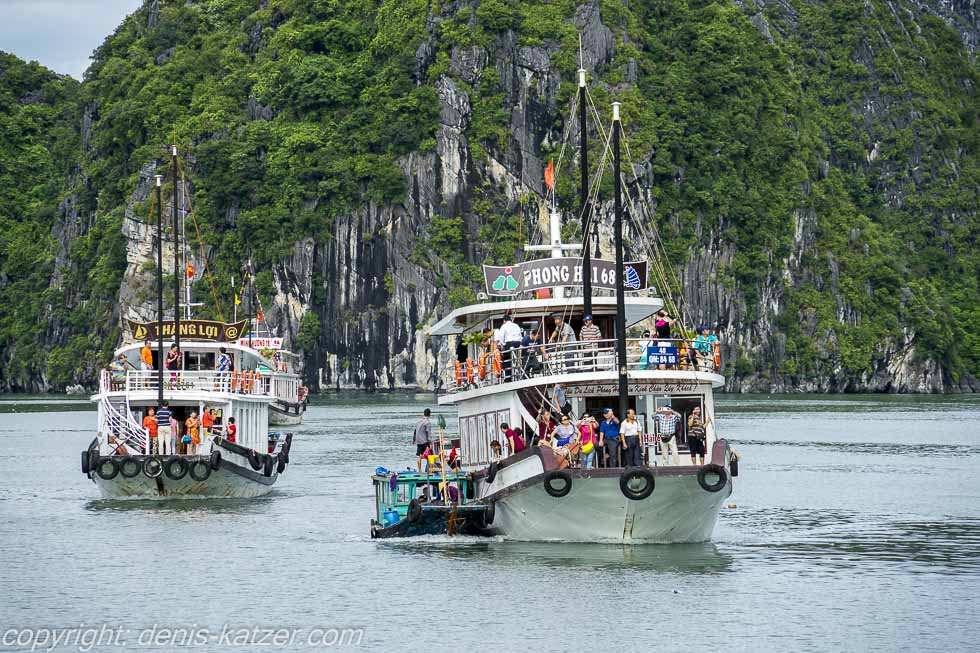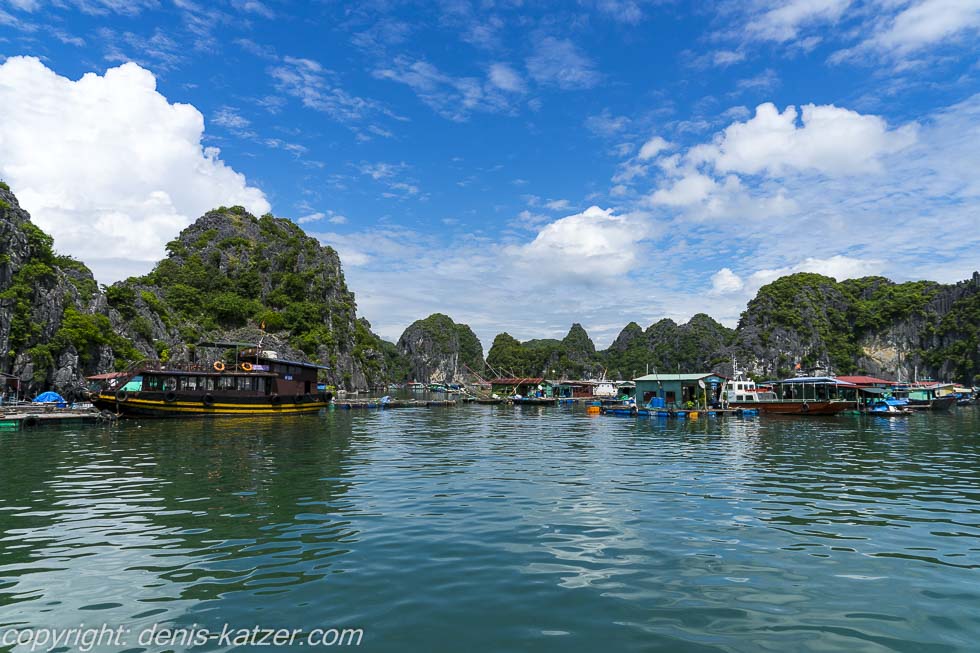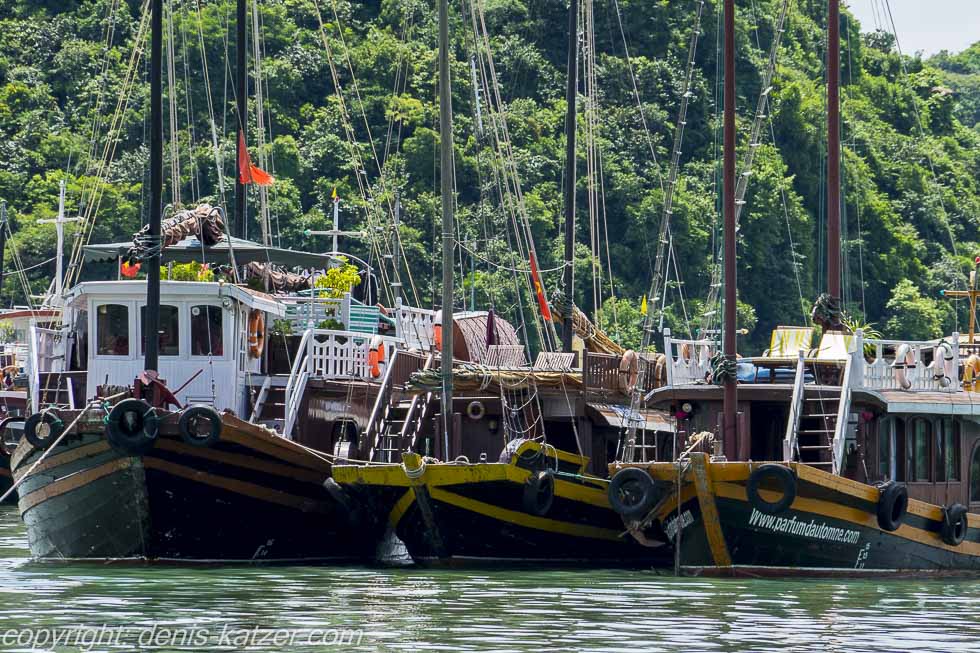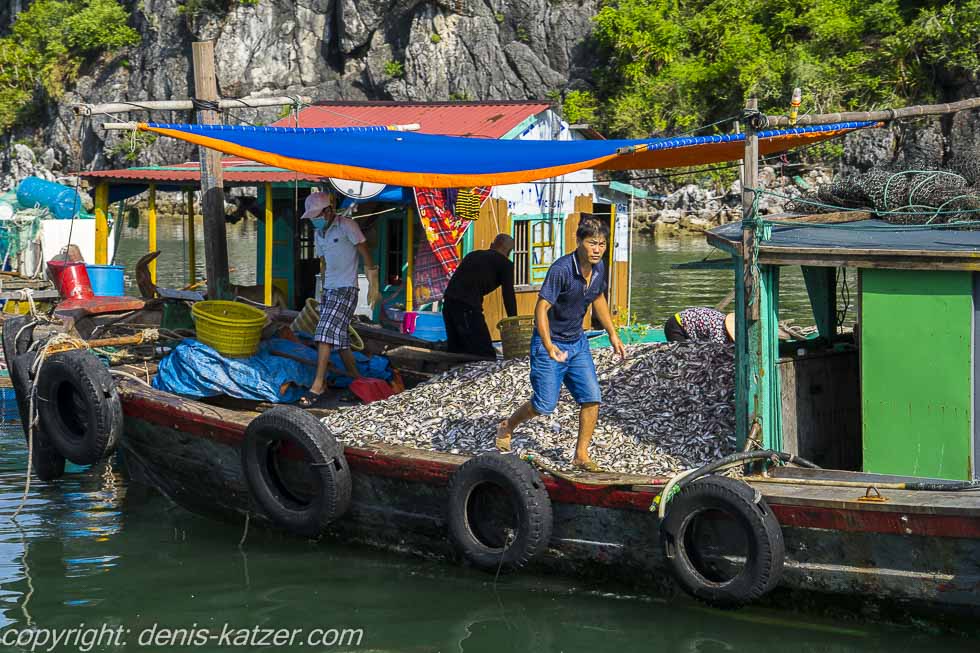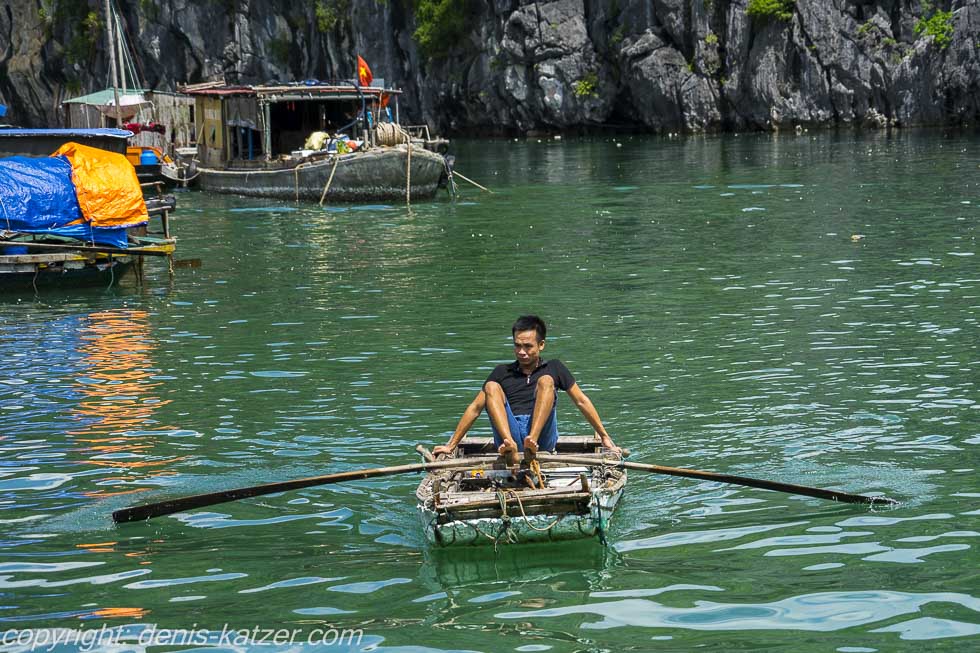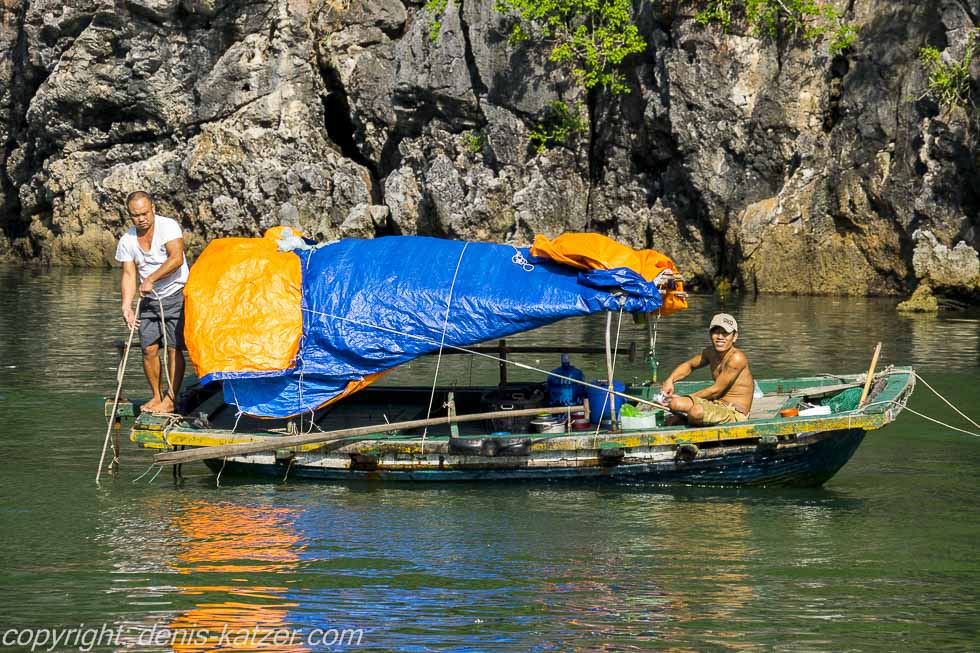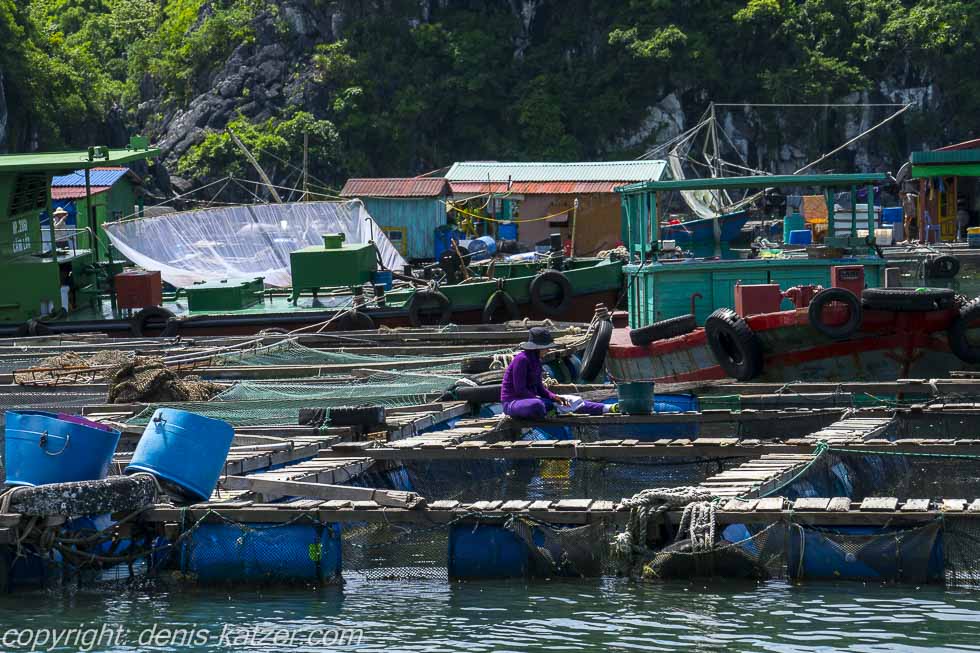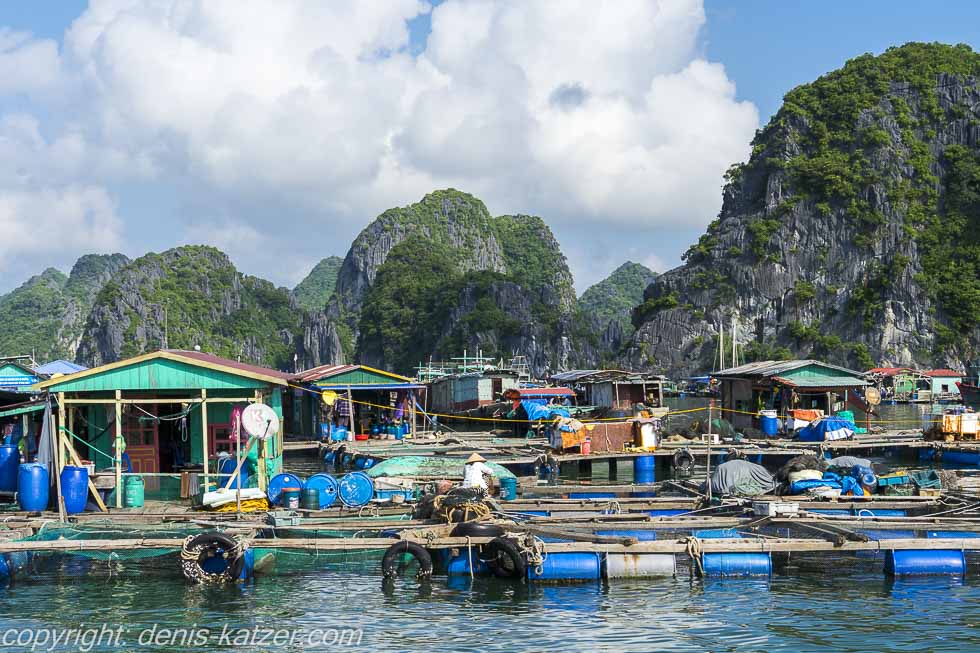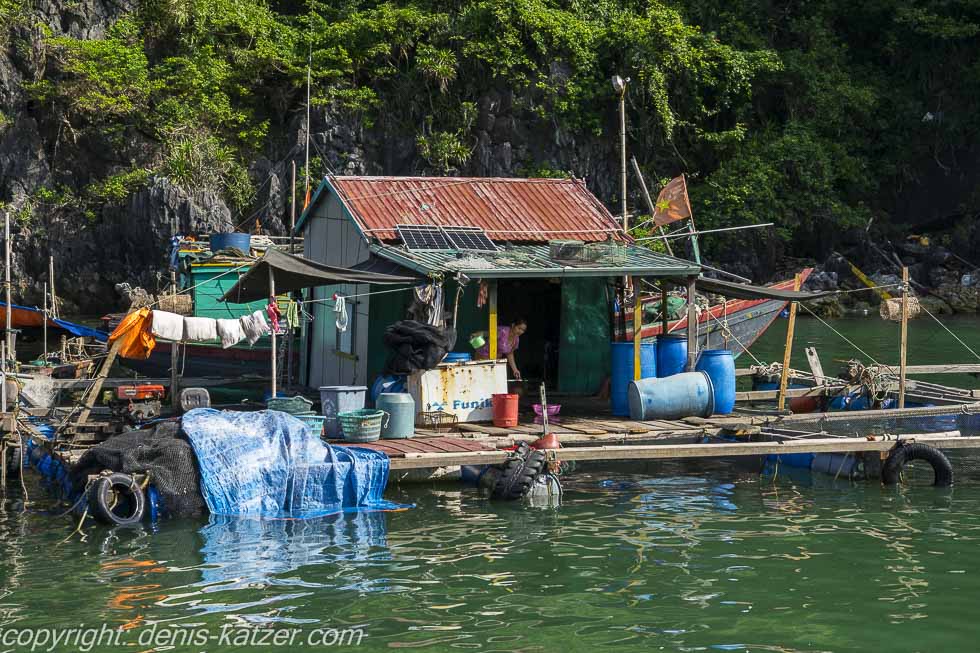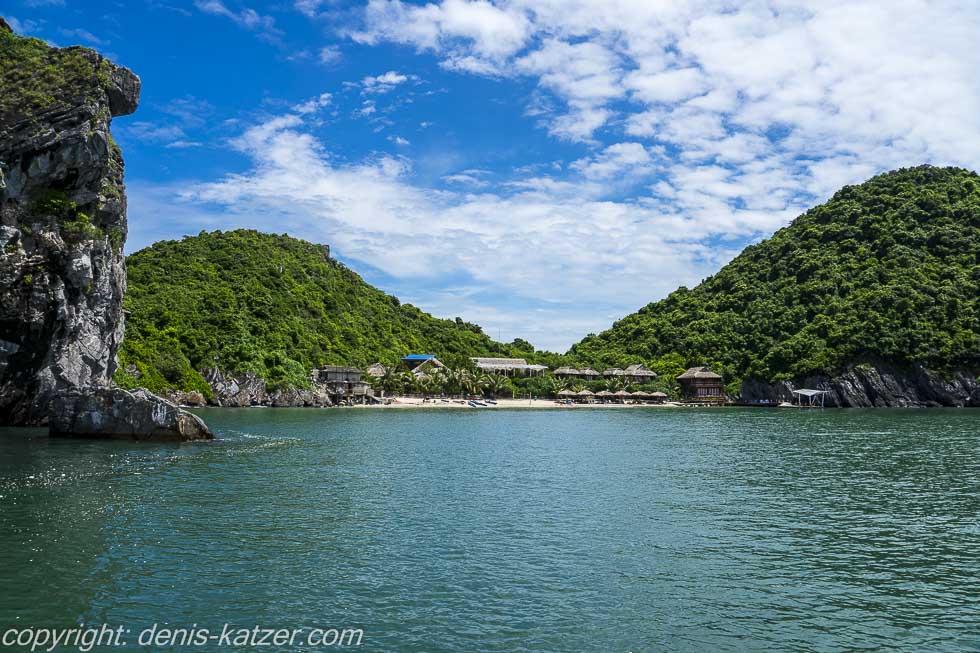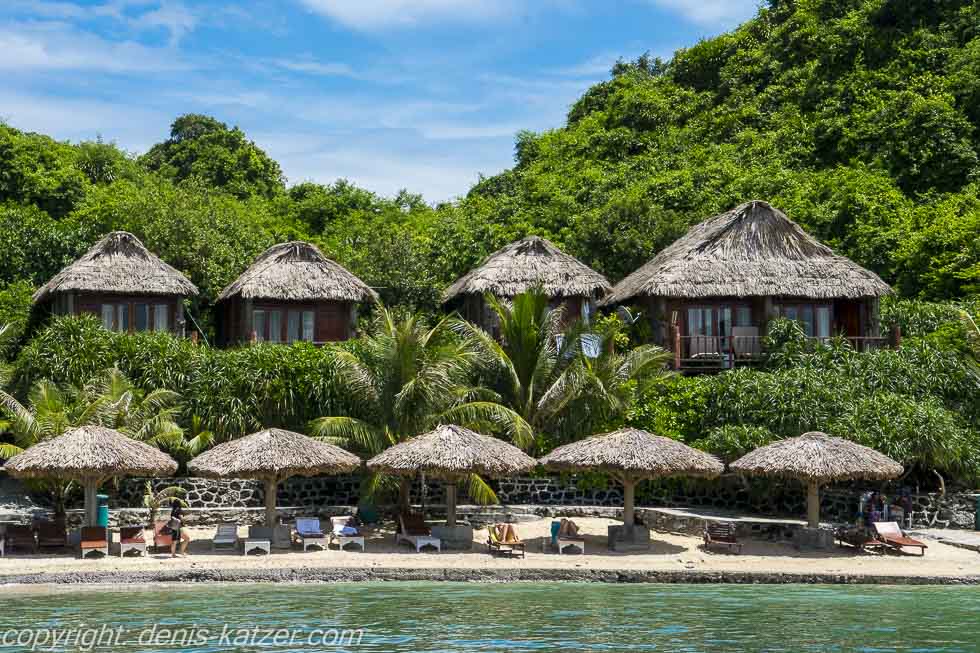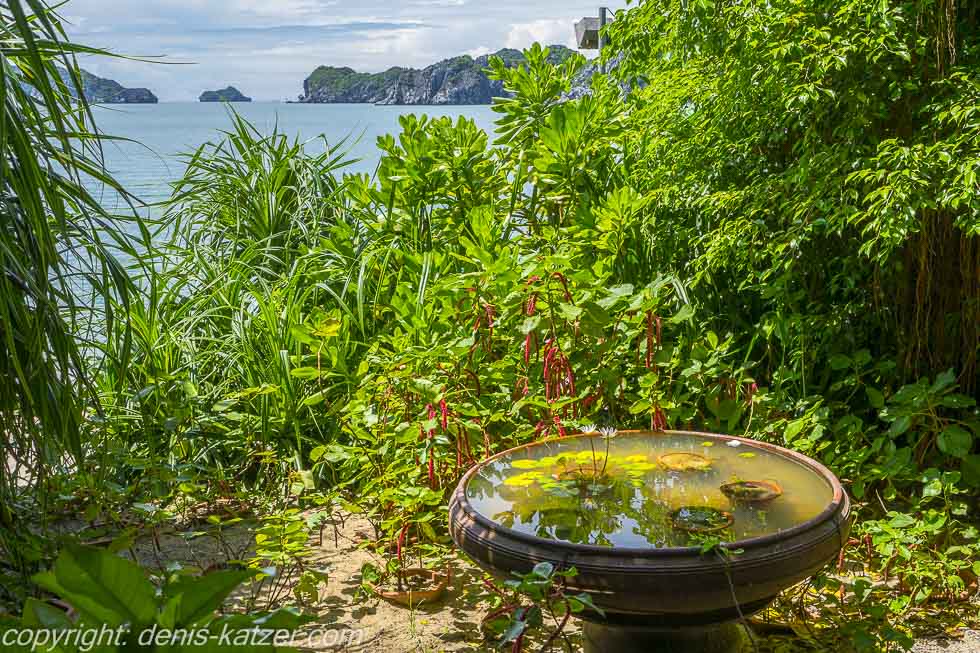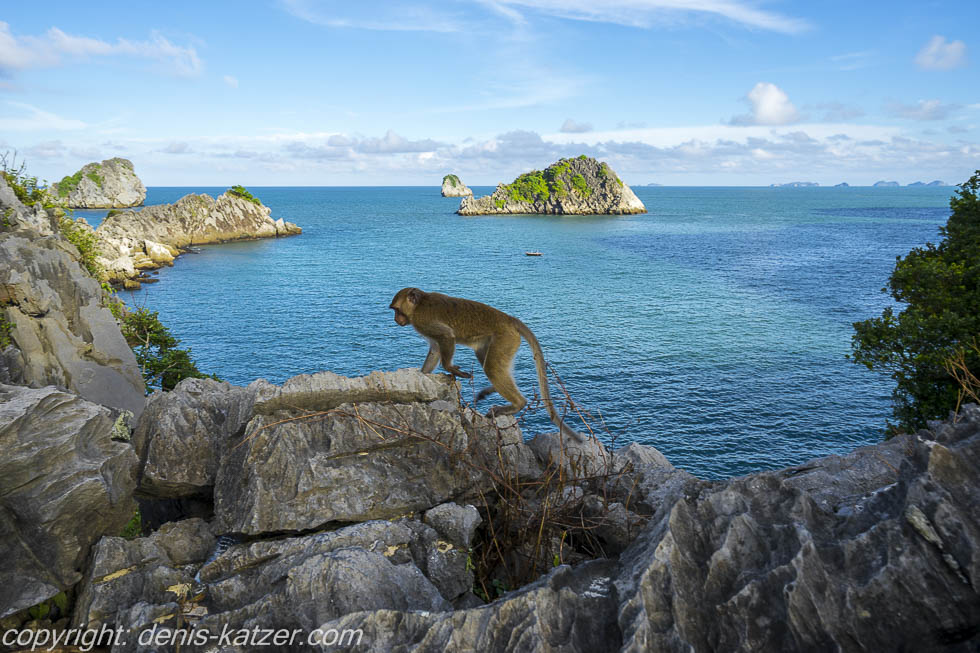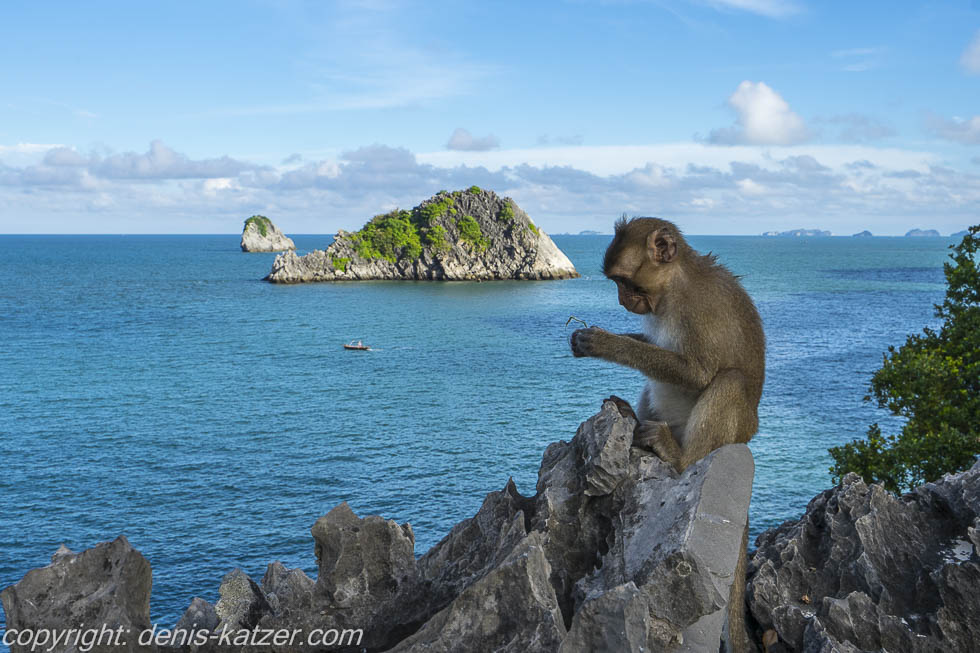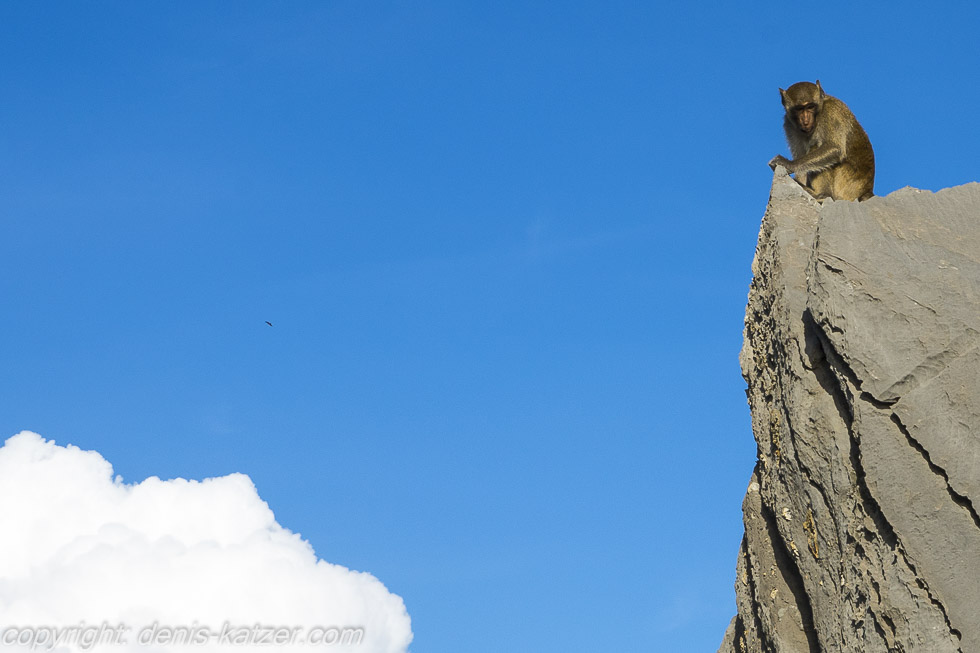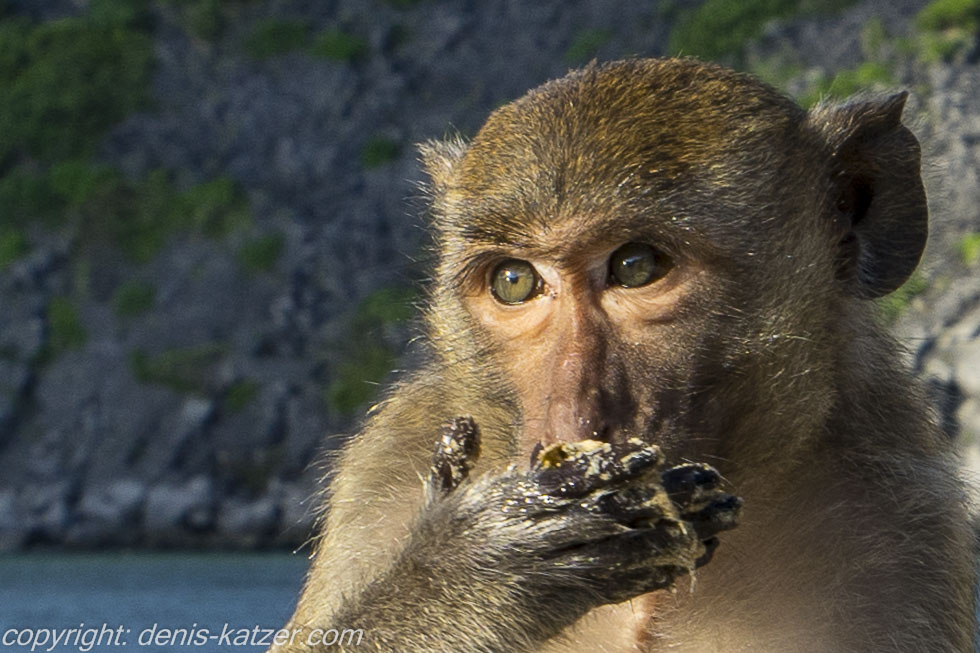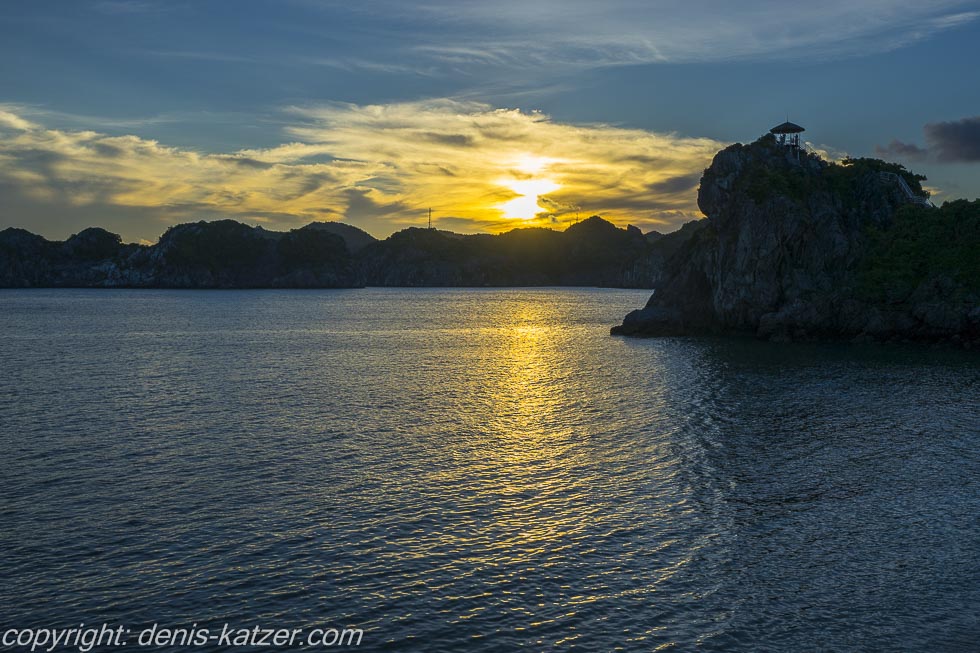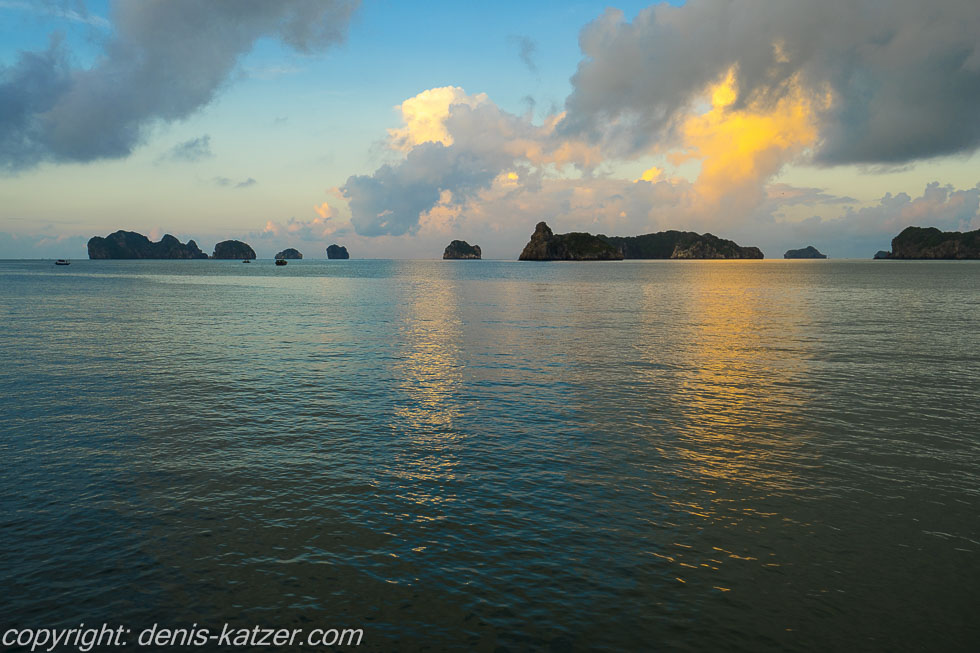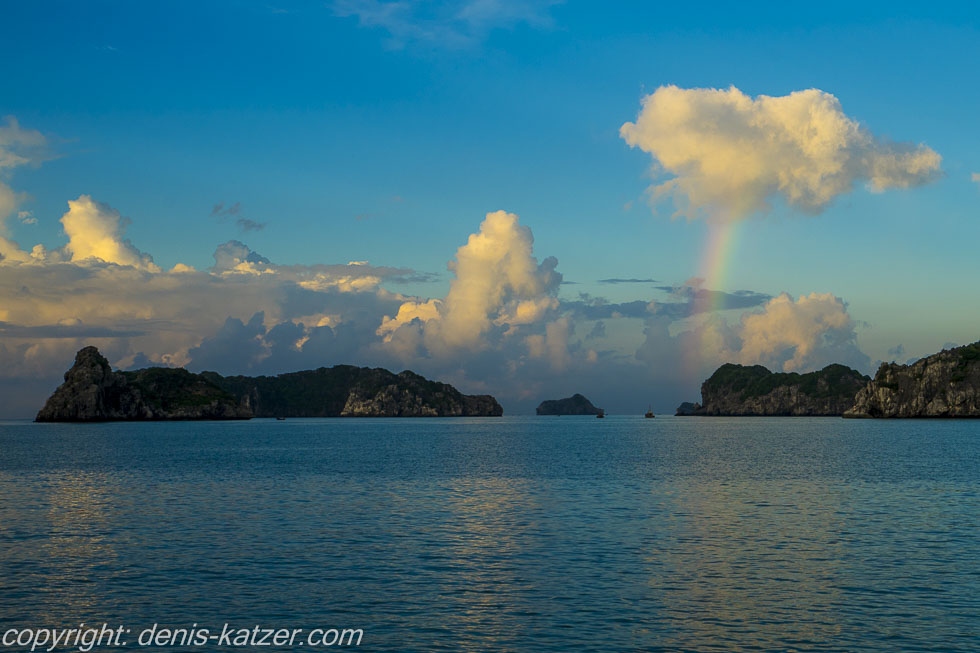
Sinking World Heritage Site, Monkey Island and Friendship Award
N 20°43'43.9'' E 107°04'42.7''
Date:
25.09.2016 until 26.09.2016
Day: 457 – 458
Country:
Vietnam
Province:
Quảng Ninh
Location:
Monkey Island
Latitude N:
20°43’43.9”
Longitude E:
107°04’42.7”
Daily kilometers:
Covered 40 km by car and boat
Total kilometers:
18,871 km
Soil condition:
Asphalt
Total altitude meters:
54.661 m
Sunrise:
05:40
Sunset:
5:46 pm
Temperature day max:
35°C
Temperature day min:
25°C
(Photos of the diary entry can be found at the end of the text).
5:30 am. The graceful silhouettes of several karst islands cast their black shadows on a water surface that ripples slightly in the morning breeze. The slowly rising hot star sends its first blood-orange rays through the leisurely drifting wispy clouds. As soon as the first streaks of light have climbed over the hills, the impressive color of the sky is reflected on the dark surface of the sea. As if the golden light had legs, it moves towards us until it illuminates our junk for a few moments in the same fairy-like glow. We sit in silence and enjoy the moments of the awakening day in Halong Bay. “What a beautiful morning,” I say reverently, listening to the gentle sound of the small waves as they splash against the side of the boat. It doesn’t take long for the fascinating play of colors to give way to brighter daylight. “Who would like a kayak for a morning trip?” asks Tang the tour guide. As the bosom miracle and her friend are still sleeping it off, the Englishman, his Vietnamese girlfriend and we are the only ones who accept the offer. Because of my shoulder injury, it’s not easy for me to paddle through the waking sea. When I dip the left paddle blade I feel an unpleasant pain. Nevertheless, I don’t want to miss out on this extraordinary experience. Gritting my teeth, I support Tanja, who is sitting just one meter in front of me and enjoying the trip with a happy expression on her face.
“There’s a lot of dirt floating around here,” I interrupt the idyllic mood. “Yes, it looks bad. You shouldn’t bathe there.” “Too late.” “Too late how?” “Well, yesterday we went swimming not far from here,” Tanja reminds us. “I wonder where all the dirt is coming from? And look, there’s a real film of oil on the surface of the water next to the floating plastic bottles.” “No wonder. According to an article in the Süddeutsche Zeitung, the bay was visited by 2.2 million people from all over the world in 2015. I’m sure that many a junk captain simply dumps his garbage into the water. According to the motto: Let someone else fish it out again. The main thing is to get rid of our dirty ballast.” “Do you really think so?” asks Tanja incredulously. “But of course. When it comes to making even more profit, the human race is completely brainless. We’ve seen that time and time again on our travels. Just think of the polluted rivers in China. Or the nightmarish air pollution in many big cities there. And none of the captains here, or whatever fool dumps his waste into the world heritage site, seems to realize that sooner or later he will destroy his own job. Or, in all probability, his own life. The fish that are still swimming around in this murky soup and will eventually end up on your plate are more likely to be regarded as euthanasia and certainly have nothing to do with a freshly caught fish from a healthy habitat,” I reply as we paddle past a junk that is at this very moment dumping a bucket of garbage into the water. Even though we had a wonderful day yesterday and enjoyed an almost indescribably beautiful sunrise today, my mood is changing. I am saddened, even annoyed, by the amount of filth on the surface of the sea and I wonder more and more how long humanity will survive this crime against our planet. “Why didn’t we notice this dirt yesterday?” wonders Tanja. “The only thing I can think of is that some boats take advantage of the night to get rid of their garbage. At least that way they can’t be seen,” I ponder. Later, I speak to the barman about the mess. He blames the pollution on the poor people living on the shore. “We have to return our waste to the port,” he justifies. I doubt whether anyone in a thoroughly corrupt system will check this in the long term.
An hour later we are sitting in the small ship’s mess having breakfast. Meanwhile, our old wooden barge continues to sail through the fabulously beautiful world. Misses Holz-vor-der-Hütte has meanwhile risen again and is arranging her wrinkled face. She uses a small brush to paint her freshly glued-on artificial eyelashes, which look more like awnings judging by their length. “Where’s your girlfriend?” I ask. “She’s not well at all,” she replies, stretching, closing her face mirror and giving me a pained smile. It’s crazy. The two dog allergy sufferers are on vacation for two weeks, take an expensive trip on a junk in a unique World Heritage Site, and miss an unforgettable sunrise and a highly interesting kayak trip. “The last cocktail was probably spoiled,” I reply, to which I earn a facial expression that expresses without words what she thinks of my remark. “Let’s go to the upper deck,” Tanja asks me. “Good idea,” I reply and follow her and Ajaci up the wooden staircase, which has been eaten away by the ravages of time. We chug slowly through the labyrinth of bays and rock formations. We pass junks whose yellow and red sails gleam in the sun and rise up into the blue sky. The upper end of the sails runs diagonally, so that one could think that the apparent tips disappear into the blue sky. “You don’t need much imagination to picture the pirate ships that were still up to mischief in this area a few decades ago,” I say, fascinated by the sight of the old ships. Then my gaze falls again on all the garbage that can be seen on the surface of the water. Huge areas of garbage are evidence of unprecedented environmental destruction. “I can’t believe it,” I groan and suffer at the sight. “The visible dirt is probably not the primary problem,” I suspect. “What do you know about it?” asks Tanja. “From what I’ve read, tourism and its negative consequences are not the only reason for the obvious destruction of this unique landscape, which was created around 500 million years ago, but increasing industrialization, urban development and coal mining are having an even greater impact on Halong Bay.” “Can you explain that in more detail?” “Well, the ever-growing human population is demanding more and more energy. And this energy has to come from somewhere. There are huge coal deposits in this region and we’ve already seen what that means in China.” “Please try to explain it in more detail so that I can imagine how coal mining pollutes this bay.” “For example, the town of Cam Pha is not far from here. Coal has been mined there for over 100 years. Today more than ever. The resulting coal dust settles on the fields, rice paddies, roads, houses and ultimately the entire landscape. Finally, of course, it ends up in our food and crunches between our teeth. Certainly not a healthy situation for the population. What is even more fatal, however, is that mining requires a lot of water. And that’s what it’s all about in the end, because the resulting mine wastewater, enriched with iron, coal, manganese, suspended particles and whatnot, is discharged unfiltered into the rivers of the entire region and ends up in this beautiful bay. All this toxic stuff is deposited, among other things, as shoreline sludge, which is why the seawater tilts and becomes acidic. There is hardly any life in acidic water, everything dies. Not even plants can thrive in it. The only herb that grows there is reed, and only because it has deep roots where the acidic mixture takes longer to reach. The positive news, however, is that the government has recognized the problem and, with the financial support of the Federal Ministry of Education and Research, has now launched projects to clean up the mine wastewater.” “Hm, doesn’t seem to be very successful if you look at the green color of the water.” “As far as I know, they’re only small pilot projects so far. They won’t have any positive impact on the water quality yet, which is why I wonder if the oysters that are grown here are even edible?” I say, pointing to the many small floating artificial islands that the locals have built, which are lined up along the shore in this area. “It’s kind of frustrating that in this day and age, even in a supposed paradise, you come across fatal environmental sins,” I hear Tanja’s muffled words. “I think that’s also because we’ve been dealing with this problem for decades and that’s precisely why our observations have become more sensitive,” I reply. “That may be the case. Sometimes that’s exactly why I wish I could see the world with a more naive eye. However, I realize that it makes no sense to bury your head in the sand like an ostrich and not see or hear anything.” “Exactly, because then the problem will bite us in the ass sooner or later,” I laugh.
The dinghy of our junk takes us to a small jetty on the island of Cát Bà. In 1994, UNESCO declared the 354 km² island a biosphere reserve on which a national park had already been established in 1986. A minibus takes us over the 332-metre-high mountains to the other side to another jetty. “The largest island in Halong Bay is extremely important for the region. It is important for the preservation of biodiversity,” explains tour guide Tang. “Why?” asks one of the passengers. “Because there are animals and plants on this island that don’t occur anywhere else. So-called endemic species. This unique landscape is home to animals and plants that are threatened with extinction, such as the langur and the golden-headed langur, which only occurs here. The latter is one of the rarest and most endangered primate species in the world. On the Cát-Bà archipelago, there are only just under 60 adult animals left, which is why the survival of this monkey species is considered extremely endangered,” he explains with a serious look. I look attentively out of the window to see if I can spot such a rare creature. Of course, I am aware that I am indulging in a ridiculous wish, because these monkeys will certainly not be jumping around on the street.
Another small wooden boat picks us up at the jetty to take us to Monkey Island. As if Ajaci had never done anything else in his life, he hops on board with a big leap. While all the tourists, including the bosom woman and her girlfriend, who is still in a bad way from yesterday’s booze-up, go to the sun deck without shade to catch a severe sunburn, we stay on the lower deck, which is open on all sides. Here too, our boat chugs through the maze of islands on whose shores numerous fishing boats and floating huts are moored. The people here live from oyster farming and fishing, which is still an artisanal activity. “I can’t wait to see how Man Do’s ex-boss receives us on his island,” I say, looking forward to relaxing there for a few days. “Me too. I hope we like it there. After the long time in Mai Chau, I’m looking forward to the change of being able to spend a few days on a remote island.” “How much time do we have until our current visa expires?” I ask. “We have to leave the country on October 15,” Tanja calculates. “That means three more weeks from today.” “Yes.” “Well, if we allow ten days for the journey from Mai Chau to the border, we can easily stay here for 1½ weeks. That sounds like a dream to my ears,” I reply as our boat chugs around the tip of a rocky outcrop, offering a view of a small, paradisiacal bay. “Is that it?” asks Tanja excitedly. “Could be.” We actually set course for the beach. At the foot of two round green hills overgrown with jungle, thatched huts are lined up behind a bright sandy beach. Tuuuhhht! Tuuuhhht! Tuuuhhht! The boat horn shrills. Their sound echoes back to us from the mountains. We board the jetty at a good 35 degrees in the shade. A few hotel employees hurry towards us to carry our luggage. Under the shade of a veranda overgrown with plants, we receive a very friendly welcome from the hotel manager. “Manh Do has already announced her. We are very happy about her visit to Monkey Island. My boss and I hope that they will stay for a long time. We will do everything we can to make them feel at home with us. As we discussed with Manh Do, they will get our best bungalow on the beach. If you wait a minute, I’ll quickly fetch my boss so that he can welcome you too,” he chats and shakes our hands. “Well that’s a welcome,” I whisper to Tanja, glancing after the polite manager. Less than five minutes later, a short, chubby man about 1.60 meters tall appears. He greets us with a friendly smile and a handshake. According to Manh Dos, the little man is a multi-millionaire who not only owns a 50-year government lease for this island, but also two large junks, coaches, tourist offices and other houses. “My ex-boss worked for the government, has contacts right to the top and is very influential,” Manh told me. We already sense a certain authority in his appearance. Watchful eyes scrutinize us. “Manh was right. You really do resemble Buddha,” I open our conversation to say something nice. “Ha, ha, ha, do you think?” “But yes,” I say, but don’t mention his potbelly, which certainly wouldn’t be a good idea either. “I hope you’re staying for a few days?” “If we like it, we would like to stay at your beautiful resort for 1 ½ weeks. I have a lot of writing to do and the view of the sea is definitely inspiring.” “Absolutely, absolutely. We are honored by your visit. You are welcome to stay for three months. The longer the better. Ha, ha, ha.” “Thank you very much for your hospitality. Nevertheless, I must ask you how much a day here at the resort will cost us?” “Please don’t worry about that. You’re family,” he replies, shakes my hand again and says goodbye. “I have some urgent business to attend to,” he calls, disappearing behind a door.
“If you would please follow me,” the manager takes the floor again and leads us to a large hut made of wood and straw, in which there are four rooms. “Can we move into the room on the second floor?” I ask, because the view of the sea is much better from up there. “I’d love to,” we hear and are delighted that Manh Do’s ex-boss actually treats us like members of his own family. “I wish you a very pleasant stay with us. If you need anything else, please let me know in good time and at any time,” the manager says goodbye. After he has gone, I try to open the door to the room. “Clamped,” I laugh. After a little levering back and forth, it pops open. “It’s relatively small here, isn’t it?” I say, entering the room. “Well, you can imagine something different under superdelux,” Tanja agrees. As the fan is not working due to a power cut and the air conditioning can only be switched on at night, it is extremely hot in the dark room. “Can you please open the window?” “Sure,” I reply. Minutes later, I am still trying to push open the wooden lattice, but without success. “The damn thing’s stuck,” I huff. Only after maybe five minutes and with a lot of force do I manage to lever the wooden lattice to one side. “Everything is totally warped. In general, the hut is in a pretty run-down state. I don’t think it’s seen any paint in the last 10 to 15 years,” I realize, feeling my initial euphoria diminish somewhat. “Even if Manh has indicated that this stay might not cost us anything, we should still get it done as soon as possible.” “But you’ve already asked the boss about the costs, haven’t you?” “Hm, his answer sounded too vague to me,” I reply, listening to my gut feeling. “Well, let’s go back to the main house and find out.”
“Sorry, my boss is having his afternoon nap,” apologizes the manager. “But we’ll let them know tonight.” “Okay, no problem,” I reply. “Enjoy the afternoon,” he says, lowering his head to check the reservations of some of the guests on the computer.
“Do you fancy a hike to the other side of the island? There you can also see the monkeys that live in the forests,” asks Tang the guide. “You mean the monkeys the island is named after?” “Of course.” “Gladly”, we reply. A little later, we climb a rocky path behind the resort with Ajaci and a few other tourists. Ajaci happily charges ahead and immediately breaks into deep and extremely sharp-edged cracks and holes with his four paws. “Is the path getting better up there?” I ask Tang because I’m worried about our dog’s health. “No, rather worse.” “There’s no way Ajaci can go up there. He would surely break his legs on those holey rocks.” “You’re right Denis. The risk is too great. I’ll go back with Ajaci. We can go back up together tomorrow if you know the way,” Tanja suggests. “Okay,” I reply. Only 20 meters further up, I crawl on all fours to avoid falling on the razor-sharp rock with its countless holes and depressions. My injured shoulder makes the scramble difficult. It would be sensible for me to turn back now. “Is there still a long way to go?” I ask. “No, no. We’ll be at the top in ten minutes,” Tang replies. I look up at the sky in amazement as a bare foot sits down on the razor blade rocks next to me. “Sure, only a European can be that stupid,” I think to myself. “Well, you’re brave,” I say, pointing to his battered feet. “Everyone needs an adventure,” he replies. “What do you know about adventure”, another thought wants to slip from my brain into my mouth, but I let it go and carry on climbing. Then some 18-year-old tourists in flip-flops come towards us. One of the girls is being supported by a guide. “What’s happened,” I ask. “Watch out for those fucking rocks. They’re as sharp as knives. I slashed my knee,” she warns, pointing to her injury. “So how many injured tourists do you have here every day?” I ask Tang. “Not that many,” is his succinct reply. Then we’re already at the top. “Don’t touch!” shouts Tang as a European tries to stroke the wild primate macho with its big balls between its legs. “But why not?” “Because the monkeys are aggressive.” “But he looks peaceful.” “Wild monkeys don’t like to be touched. Their bite can really hurt. Apart from that, they could transmit rabies.” “Rabies?” “Yes, rabies, although I think these monkeys are healthy.” “Okay then, better not touch them,” says the tourist, raising his camera to take a photo of the animal. Just at that moment, the monkey macho swings down from its tree, lands springily on a rock and jumps onto the photographer’s shoulder in one mighty leap. “Oops! Oooooo!” he screams as he feels the animal’s claws in his flesh. He drops to his knees under the weight of the primate and rises again as it disappears into a tree behind him. “Wow, that was fast!” says the tourist, whose face, reddened by the sun, has suddenly lost all color. When we reach the beach on the other side of the island, we come across another gang of monkeys. They jump around wildly on the roof of the bamboo bar. Always on the lookout to steal something or other from the tourists, they interrupt their romp and watch the big two-legged creatures. “Aaaahhhhhhhh!”, I scream in horror. As if the devil himself were after him, a young man races across the beach. At his heels is one of the hairy thieves. Aaaahhhhhhhh!”, screams the wild fugitive again, lifts his camera upwards and plunges into the saving sea. “What was going on?” I ask him as he comes out of the water like a watered poodle. “That fucking monkey tried to bite me. So I saved myself in the water. You never know what diseases these creatures carry.” “Hm, that’s right. But why did you run into the water with your camera? The salt water will destroy it?” I ask. “I wanted to save it. I’ve heard that monkeys steal cameras too.” “Could be. Have a nice day then. Oh yes, when you get to the hotel, clean them with fresh water as quickly as possible.” “Yes, I’ll do that. Thank you.”
We study the menu before dinner. “That’s crazy. The prices will soon be four times as high as on the mainland,” I shudder. “What would you like? Can I buy you a beer?” asks Manh Do’s ex-boss as he walks past. “Gladly”, we reply and before I can say anything else, he has already disappeared again. Then the plant manager rushes over. We sit down at a table. “Well, I’ve now spoken to my boss about the prices. Because you’re friends of Manh’s, he’s giving you an absolute friendship price as promised, family so to speak.” “So the stay will cost us something after all,” I think, but I don’t want to be dissatisfied because a friendship price is also a great offer. “And what will they charge for a night?” I finally want to know, as the manager is making it really exciting. “For the bungalow room only 80 US$ dollars a day.” I sit there thunderstruck and struck by lightning and think I’ve misheard. “Only US$80?” “Yes,” he grins. “During the day or during the week?” “During the day, of course.” “With full board for both of us?” I ask, although even that would be outrageous for a friendship price. “No, but your breakfast is included.” Tanja and I look at each other. Having spent many years in Asia over the last 25 years, I know how important it is not to wear your current emotions on your face. So I continue to play the already lost poker game and say: “Hmm, and what is the absolute special price of our boat tour?” “Only US$160.” “Only US$160?” “Yes.” “For both of us?” I ask, because in the meantime we know that our fellow travelers have paid US$ 120 per person for the two-day boat tour with overnight stay on the junk and in the resort. “Uh, I don’t know about that. If you’d like to wait a moment? I’ll ask my boss quickly.” “Gladly,” I reply. Minutes later, he sits down at the table with a somewhat pained expression on his face. “So, uh… US$160 per person. That means US$320 for both of you. Normally we charge US$180 per person. As I said, that’s a great price for a friend.” “Lousy cheat,” I think to myself and laugh at him. “So our fellow travelers got the tour from the travel agency at an official price of US$ 120 per person. That means your super friend price costs us US$ 80 more. Why?” “Uh, if you’d like to wait a moment?” he apologizes with a wrinkle on his forehead and disappears. Then he comes back. “I have good news. The price for you is also US$ 120 per person. Sorry I gave you the wrong price. “Big ass,” it goes through my head. Only with difficulty can I stop my brain from sending a signal to my mouth to shout out this indecent swear word. On the contrary, I smile. “Okay, the price for the boat tour has obviously been settled. But we still need to work on the room rate. You know, we live from and through our writing work. When we stay in a hotel for a longer period of time, we negotiate special conditions with or without family discounts or super friend rates. If a hotel invites us to photograph or report on the facilities, they usually give us a very good discount. In some cases, the stay including board and lodging is free of charge. It’s a bit like paying your boss money every day to work here. In such a case, you would never work here. Do you understand?” “Uh, not really.” “Explained another way. If we write for a hotel, and I understood you were interested, we get a free stay in return. It’s a win-win situation. We have a nice stay despite our work and the hotel doesn’t have to pay for this work. Do you understand?” “Absolutely.” “Good. We won’t pay US$80 a day for the room whether we write something for you or not. Please ask your boss for the real friendly rate.” “If you would like to wait a moment?” “Gladly.” This time the man groans considerably as he sinks into the chair opposite us. “The last offer from my boss is US$ 60 per night.” “Too expensive.” “On the Internet, we’re asking US$ 180 per night for the bungalow you’re currently staying in.” “US$ 180?” “Yes.” “Why is our neighbor I spoke to this afternoon only paying US$100?” This time, the manager responds with a long silence. “I don’t think we can find a solution here. Under these circumstances, we’ll leave tomorrow,” I say resolutely. “We would love to have you here for longer. If you want, you can move into one of the rear bungalows for just US$50.” “The rear bungalows are so small that you can hardly move in them. As you know, we have a big white dog with us. The three of us won’t fit in there. Apart from that, it’s very dark in the second and third row because of the dense jungle growth. As a writer, I only get depressed. What’s more, US$50 per night for the small bungalows is the normal off-season price. And we’re in the low season, aren’t we?” “Certainly.” “Well, thank you for your exceptional hospitality and the wonderful stay. It would be nice if you could finish the bill by tomorrow morning. We will be leaving.” “Yes, of course. I wish you a good night.” “You too,” I say as we rise and leave the table. “Well, that didn’t go as planned, but I don’t like it here as much as I expected anyway,” says Tanja. “Yes, somehow the resort is geared towards fast mass tourism,” I reply, pointing to the 50 guests queuing at the buffet. “Then we’ll just go back to Mai Chau. We know what we have there, the prices are fair and the valley is paradisiacally beautiful.” “I agree with you. Off to Mai Chau.”…
If you would like to find out more about our adventures, you can find our books under this link.
The live coverage is supported by the companies Gesat GmbH: www.gesat.com and roda computer GmbH http://roda-computer.com/ The satellite telephone Explorer 300 from Gesat and the rugged notebook Pegasus RP9 from Roda are the pillars of the transmission. Pegasus RP9 from Roda are the pillars of the transmission.
